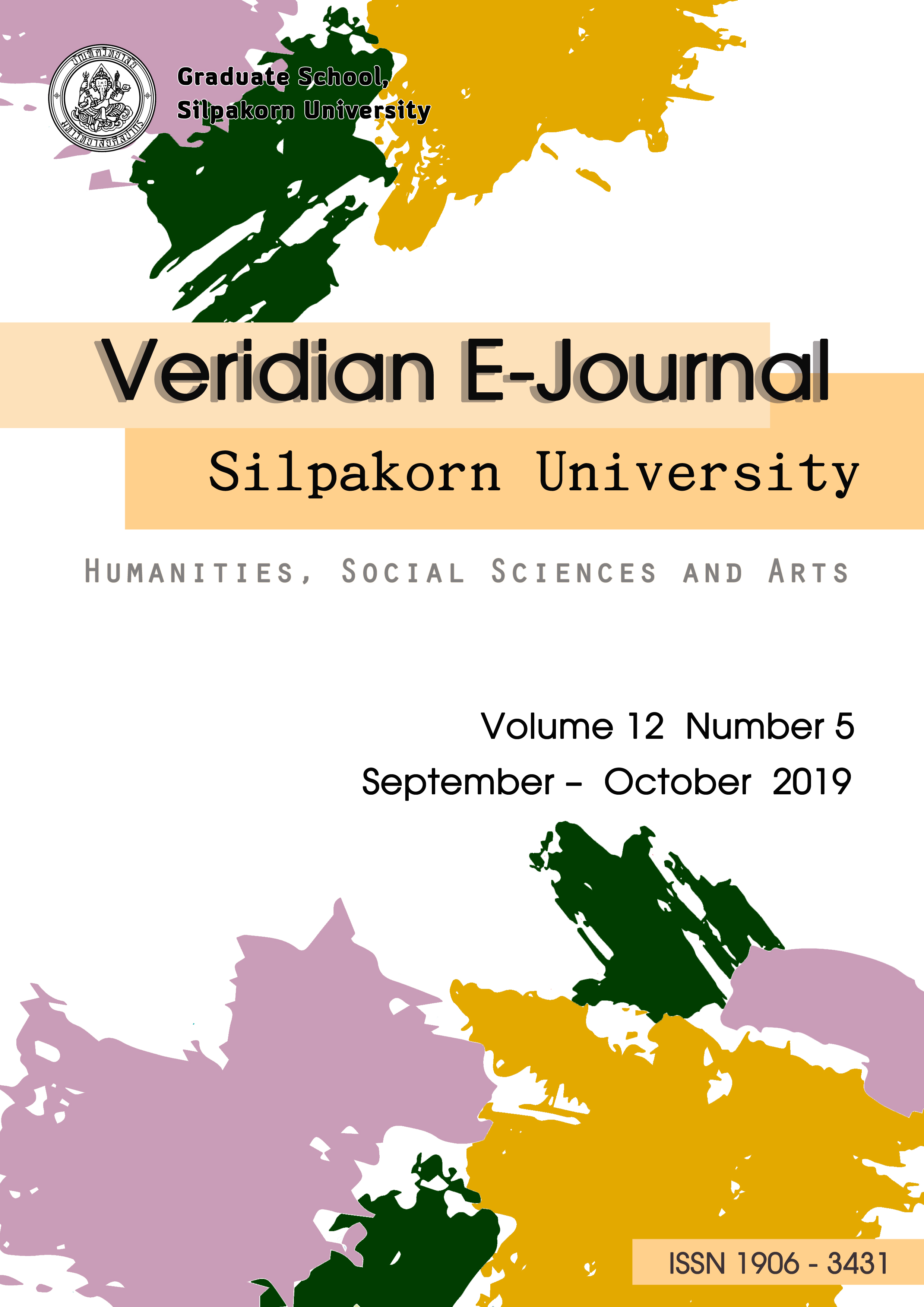แนวทางการพัฒนาภาวะผู้นำแบบบารมีของข้าราชการส่วนการศึกษา โรงเรียนนายร้อยพระจุลจอมเกล้า (The Guidelines For The Developing The Charismatic Leadership Of Officials Under The Academic Division,Chulachomklao Royal Military Academy)
Main Article Content
บทคัดย่อ
การวิจัยครั้งนี้เป็นการวิจัยเชิงสำรวจโดยมีวัตถุประสงค์เพื่อศึกษา 1) ระดับภาวะผู้นำแบบบารมีของข้าราชการส่วนการศึกษา 2) เปรียบเทียบภาวะผู้นำแบบบารมีของข้าราชการส่วนการศึกษา จำแนกตามลักษณะทางประชากรศาสตร์ และ3) แนวทางการพัฒนาภาวะผู้นำแบบบารมีของข้าราชการส่วนการศึกษา กลุ่มตัวอย่างที่ใช้ได้แก่ข้าราชการส่วนการศึกษา โรงเรียนนายร้อยพระจุลจอมเกล้า จำนวน 130 คน ได้มาจากการสุ่มตัวอย่างแบบใช้หลักความน่าจะเป็นแบบแบ่งชั้นภูมิโดยกำหนดชั้นภูมิเป็นกองวิชาและผู้บริหารส่วนการศึกษาจำนวน 5 คน
เครื่องมือที่ใช้ในการวิจัยเป็นแบบสอบถามชนิดมาตราส่วนประมาณค่าของลิเคิร์ท 5 ระดับที่มีค่าความเชื่อมั่นเท่ากับ 0.907 และแบบสัมภาษณ์ วิเคราะห์ข้อมูลและประมวลผลด้วยโปรแกรมสำเร็จรูปทางสถิติ สถิติที่ใช้ในการวิเคราะห์ข้อมูล ได้แก่ ค่าเฉลี่ย ส่วนเบี่ยงเบนมาตรฐาน การทดสอบที การวิเคราะห์ความแปรปรวน โดยกำหนดค่านัยสำคัญทางสถิติที่ระดับ 0.05 และการวิเคราะห์เนื้อหา
ผลการวิจัยพบว่า 1) ภาวะผู้นำแบบบารมีของข้าราชการส่วนการศึกษาโดยภาพรวมและรายด้านอยู่ในระดับมาก ลำดับแรก ด้านพฤติกรรมผู้นำ รองลงมา ด้านคุณลักษณะผู้นำ และด้านปฏิสัมพันธ์ ตามลำดับ 2) ข้าราชการส่วนการศึกษาที่มีอายุต่ำกว่า 39 ปี และตั้งแต่ 39 ปีขึ้นไป มีความคิดเห็นต่อภาวะผู้นำแบบบารมีโดยภาพรวม และรายด้าน ได้แก่ ด้านพฤติกรรมผู้นำ และด้านปฏิสัมพันธ์แตกต่างกันอย่างมีนัยสำคัญทางสถิติที่ระดับ 0.05 โดยข้าราชการที่มีอายุตั้งแต่ 39 ปีขึ้นไปมีความคิดเห็นต่อภาวะผู้นำแบบบารมีโดยภาพรวม ด้านพฤติกรรมผู้นำ และด้านปฏิสัมพันธ์มีค่าเฉลี่ยสูงกว่าข้าราชการที่มีอายุต่ำกว่า 39 ปี 3) ข้าราชการส่วนการศึกษาที่มีประสบการณ์การทำงานต่างกันมีความคิดเห็นต่อภาวะผู้นำแบบบารมี ด้านพฤติกรรมผู้นำแตกต่างกันอย่างมีนัยสำคัญทางสถิติที่ระดับ 0.05 โดยข้าราชการที่มีประสบการณ์การทำงานตั้งแต่ 26 ปีขึ้นไปมีความคิดเห็นต่อภาวะผู้นำแบบบารมี ด้านพฤติกรรมผู้นำมีค่าเฉลี่ยสูงกว่าข้าราชการที่มีประสบการณ์การทำงาน น้อยกว่า 26 ปีลงมา และ 4) แนวทางการพัฒนาภาวะผู้นำแบบบารมีของข้าราชการส่วนการศึกษา ได้แก่ นโยบายการยกระดับภาวะผู้นำของข้าราชการเพื่อเสริมสร้างวัฒนธรรมองค์กรและวัฒนธรรมการเรียนรู้การวิจัยครั้งนี้ก่อให้เกิดองค์ความรู้เกี่ยวกับคุณลักษณะพฤติกรรมผู้นำเป็นองค์ประกอบที่สำคัญของภาวะผู้นำแบบบารมีของข้าราชการส่วนการศึกษา อันจะนำไปสู่การพัฒนาองค์การให้มีประสิทธิภาพอย่างยั่งยืนต่อไป
This survey research aims to study 1) the level of the Charismatic Leadership of Academic Division officials, 2) the comparison of the Charismatic Leadership of Academic Division officials classified by demography characteristics and 3) the guideline on the development of the Charismatic Leadership of Academic Division officials. The sample used in this research were 130 officials under the Academic Division, Chulachomklao Royal Military Academy collected through Stratified Random Sampling method specified by Departments and 5 Academic Division administrators. The tools of this research were 5–points Likert scale questionnaire with reliability of 0.907 and the interview form. Data was analyzed and processed by statistical package program. Statistical processes used for data analysis were Mean, Standard Deviation, T-test, Analysis of Variance which specified the statistical significance value at 0.05 and Content Analysis.
The results of this research were found that 1) the overall and individual aspects of Charismatic Leadership of Academic Division officials were at high level, the highest one was leader behavior followed by leader characteristic and interaction respectively, 2) The Academic Division officials under and over the age of 39 had view on overall aspects and individual aspect of Charismatic Leadership as follows the leader behavior and the interaction with the statistical significance values at 0.05. The Academic Division officials over the age 39 had higher view on overall aspects of Charismatic Leadership in the leader behavior and the interaction than the Academic Division officials under the age of 39, 3) The Academic Division officials with different work experience had different view of Charismatic Leadership in the leader behavior with statistical significance value at 0.05. The Academic Division officials over 26 years of work experience had higher view on Charismatic Leadership in the leader behavior than the Academic Division officials under 26 years of work experience and 4) the guideline on the development of Charismatic Leadership of the Academic Division officials was the policy on officials leadership improvement for the enhancement of organizational and learning cultures. This research brought about the knowledge on characteristics of leader behavior which was the key factor of Charismatic Leadership of Academic Division officials and would lead to the sustainable effective organizational development in the future.

